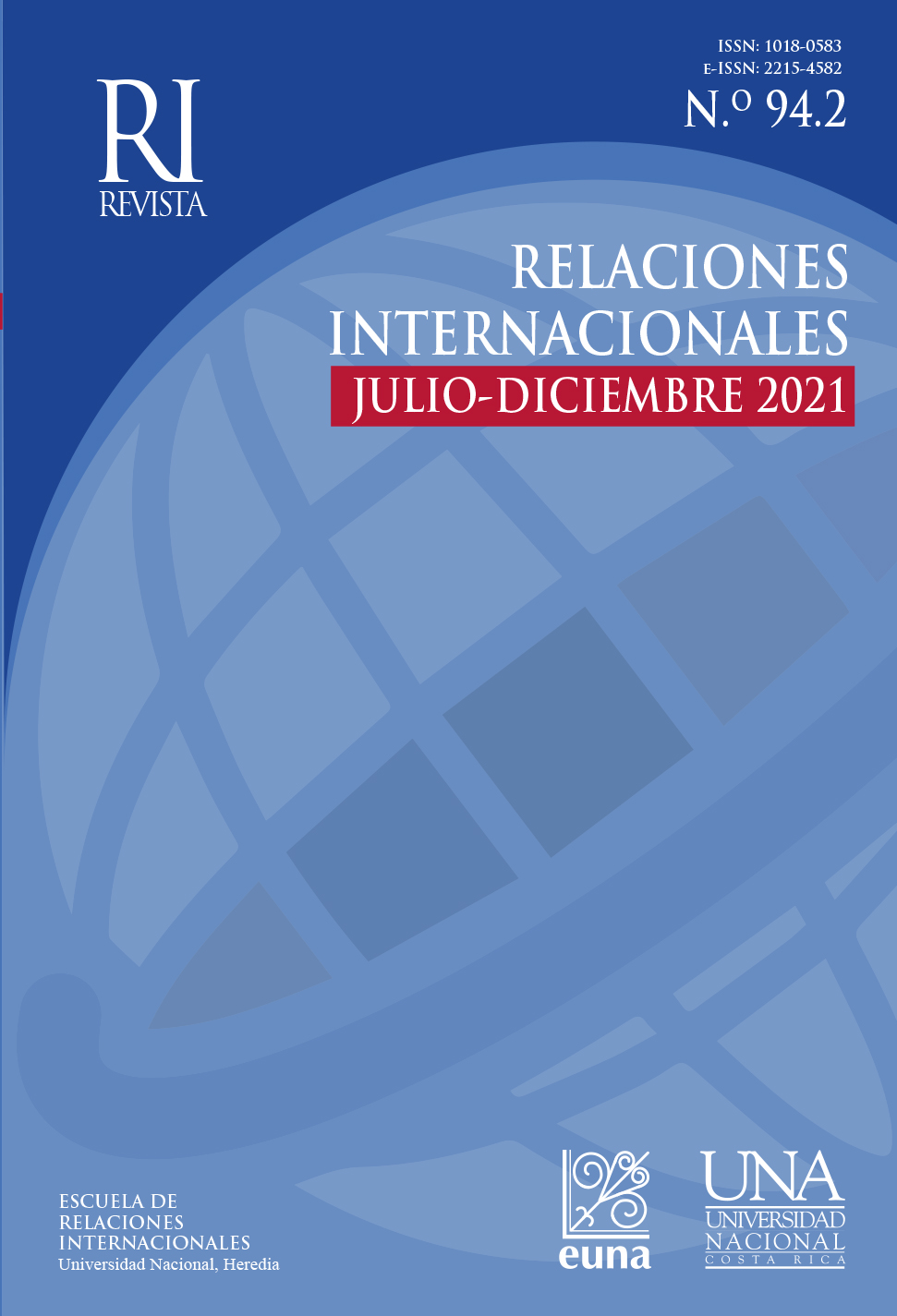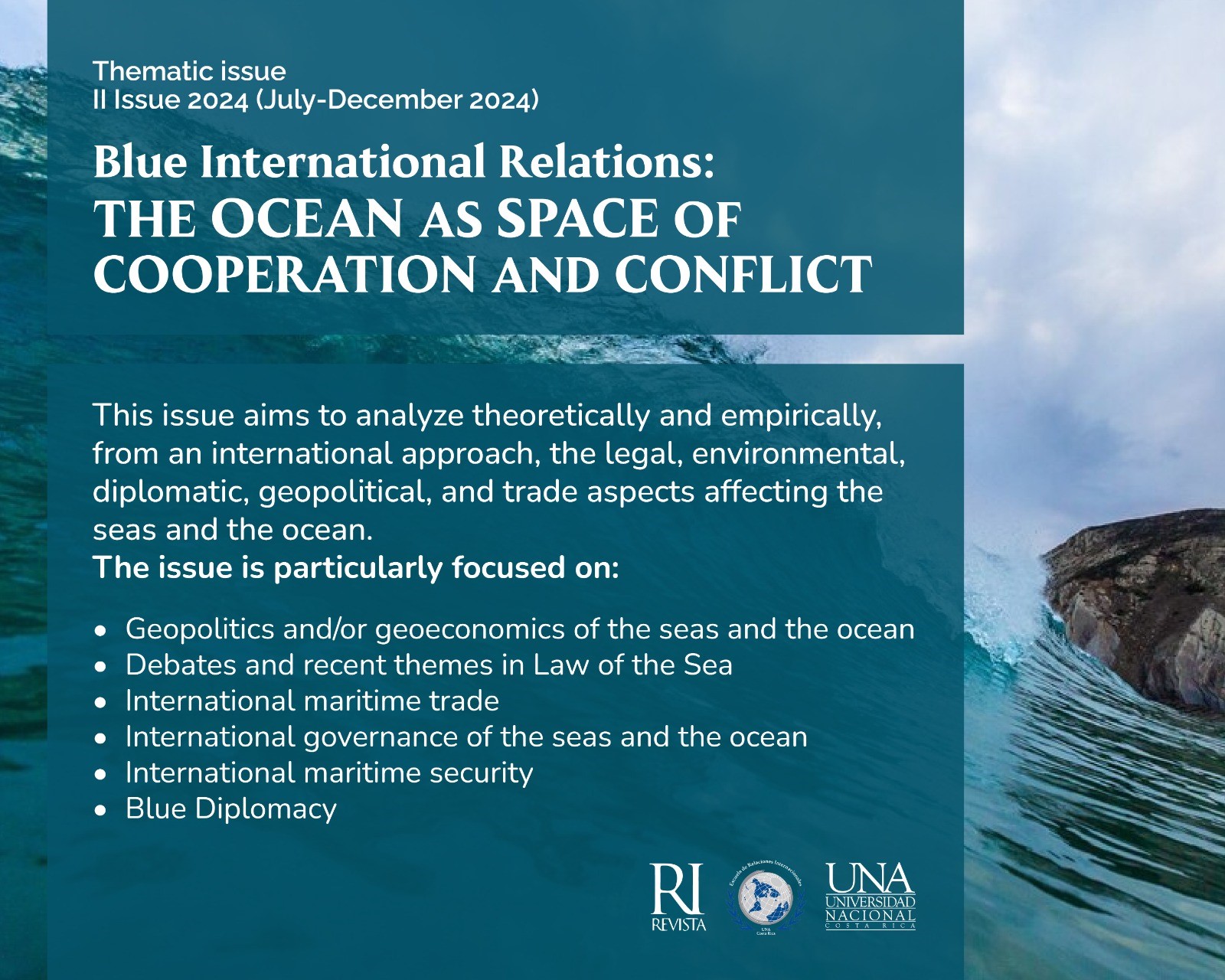Independent States: A Perspective from International Relations
DOI:
https://doi.org/10.15359/ri.94-2.1Keywords:
States, independence, recognition, responsibility to protect, self-determination, sovereignAbstract
According to the nature of the Westphalian system, the independent state is the central actor in international relations; however, the discipline has not developed theoretical approaches regarding the independence process which is considered more a concern of the international law and the political interests of state actors. Then, in this article, the issue of independence is analyzed as a basic step for political entities to access the statehood becoming this a basis for understanding the role of the independent State in the Westphalian order. Acknowledging the existence of deep changes in the international system, it is necessary to observe the variations in the conception of independence, especially regarding self-determination and recognition principle. This principle has greater relevance since the 1990s due to the disintegration processes of some countries, being Kosovo one of the main cases. Taiwan is also a relevant experience. Another key point is the weakening process of the state, with the appearance of variants that question the status and existence of the state actor. At the end of this paper, a brief reference is made to the Latin and Central American experience, which show particularities since the 19th century.
References
Aspremont, J. (2014). The International law of statehood: craftsman for the elucidation and regulation of birth and death in the international society. Amsterdam Law School Legal Studies Research Paper 2014-37. https://hdl.handle.net/11245/1.445404
Basu, A. (2012). Postcolonialism: Independence or Interdependence?. The IUP Journal of English Studies, 7(3): 74-80. http://ebookcentral.proquest.com
Baylis, J., & Smith, S. (2005). The Globalization of World Politics. An introduction to international relations (3rd edition). Oxford University Press.
Brown, P. (1915). The Theory of the Independence and Equality of States. The American Journal of International Law, 9(2): 305-335. https://www.jstor.org/stable/2187161
Buzan, B. & Lawson, G. (2015). The Global Transformation. History, Modernity and the Making of International Relations. Cambridge University Press.
Cornago, N. (2017). Beyond self-determination: norms contestation, constituent diplomacies and the co-production of sovereignty. Global Constitutionalism, 6(2): 327-358. https://doi.org/10.1017/S2045381717000132
Diez, T., Bode, I, & Da Costa, A. (2011). Key Concepts in International Relations. Sage Publications. EBSCO Publishing AN: 372452.
Economides, S. (2013). Kosovo, Self-Determination and the International Order. Europe-Asia Studies, 65(5): 823-836. http://dx.doi.org/10.1080/09668136.2013.802130
Fierke, K. (2017). Introduction: Independence, global entanglement, and the coproduction of sovereignty. Global Constitutionalism, 6(2): 167-183. https://doi.org/10.1017/S2045381717000089
French, D. (2013). Introduction. In D. French (Ed.), Statehood and Self-Determination: Reconciling Tradition and Modernity in International Law (pp.1-20). Cambridge: Cambridge University Press.https://doi.org/10.1017/CBO9781139248952.003
Goldstein, J. (2001). International Relations (4th edition). Longman.
Griffiths, R. (2016). The State of Secession in International Politics. E-International Relations. https://www.e-ir.info/2016/09/23/the-state-of-secession-in-international-politics/
Gruhn, I. (2015). State Formation, Theory of. In N. Smelser & P. Baltes (Eds.), International Encyclopedia of the Social & Behavioral Science (2 ed), vol. 23. Cambridge University Press. http://dx.doi.org/10.1016/B978-0-08-097086-8.93132-5
Harris, M. (2020). Struggle for Sovereignty: An African-American Colonization Attempt and Delicate Independence in Mid-Nineteenth Century Central America. Graduate Theses, Dissertations and Problem Report. West Virginia University. https://researchrepository.wvu.edu/etd/7600
Jackson, R. (2016). Independence by Right. In T. Young (Ed.), Readings in the International Relations of Africa (pp. 19-32). Indiana University Press. http://ebookcentral.proquest.com
King, D., & Le Galès, P. (2012). State. In E. Amenta, K. Nash & A. Scott (Eds.),The Wiley-Blackwell Companion to Political Sociology, pp 107-119. https://doi.org/10.1002/9781444355093.ch10
Lingua, G. (2021, June 10). The juridical personality of the Holy See and its activity in the international community. Apostolska Nuncijatura U RH. Retrieved June 12, 2021, from https://ika.hkm.hr/apostolska-nuncijatura-u-rh/presentation-of-the-apostolic-nuncio-in-croatia-msgr-lingua-to-the-diplomatic-club/
Loughlin, M. (2010). Foundations of Public Law. Oxford University Press. http://ebookcentral.proquest.com/
Luns, J. (1964). Independence or Interdependence. International Affairs, 40(1):1-10. https://www.jstor.org/stable/2609693
Murillo, C. (2018). Reconceptualización de Relaciones Internacionales en un mundo transformado. Escuela de Relaciones Internacionales, Universidad Nacional, Costa Rica.
Murillo, C. (2020). Un siglo de Relaciones Internacionales: la necesidad de una reconceptualización en el marco del siglo XXI. Revista de Relaciones Internacionales de la UNAM. Núm. 138, septiembre-diciembre.
Oszlak, O. (1983). Reflexiones sobre la formación del Estado y la construcción de la sociedad argentina. Desarrollo Económico Revista de Ciencias Sociales.
(84): 531-548. https://doi.org/10.2307/3466613
Pinedo, J. (2010). El concepto Segunda Independencia en la historia de las ideas en América Latina: una mirada desde el bicentenario. Atenea. 502: 151-177.http://dx.doi.org/10.4067/S0718-04622010000200009
Pospisil, J. (2017). ‘Unsharing’ sovereingty: G7+ and the politics of international statebuilding. International Affairs, 93(6): 1417-1434. https://doi.org/10.1093/ia/iix188
Reus-Smit, C. (2011). Struggles for Individual Rights and the Expansion of the International System. International Organization, 65(2); 207-242. https://www.jstor.org/stable/23016811
Ricardo, R. (2021). Interstate Patronage and the Westphalian Narrative of International Politics. Academia Letters, Article 366. https://doi.org/10.20935/AL366
Riegl, M., & Dobos, B. (2018). Power and Recognition: How (Super)Powers Decide the International Recognition Process. Politics & Policy, 46(3): 442-471.https://doi.org/10.1111/polp.12257
Ryngaert, C., & Sobrie, S. (2011). Recognition of States: International Law or Realpolitik? The Practice of Recognition in the Wake of Kosovo, South Osetia, and Abkhazia. Leiden Journal of International Law, 24(2): 467-490. https://doi.org/10.1017/S0922156511000100
Summers, J. (2013). The internal and external aspects of self-determination reconsidered. In D. French (Ed.), Statehood and Self-Determination: Reconciling Tradition and Modernity in International Law (pp. 229-249). Cambridge: Cambridge University Press. https://doi.org/10.1017/CBO9781139248952.014
Zhao, T. (2009). A Political World Philosophy in terms of All-under-heaven (Tianxia). Diogenes, 221: 5-18. https://doi.org/10.1177/039219210910214
Published
How to Cite
Issue
Section
License

Revista de Relaciones Internacionales por Universidad Nacional de Costa Rica está bajo una Licencia Creative Commons Atribución-NoComercial-SinDerivar 4.0 Internacional








1.png)







3.png)
